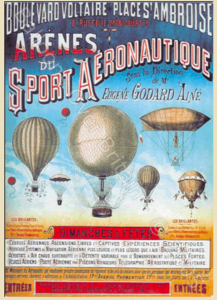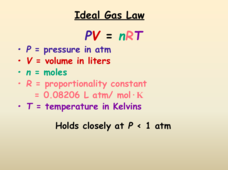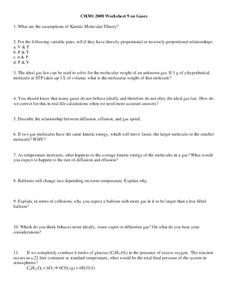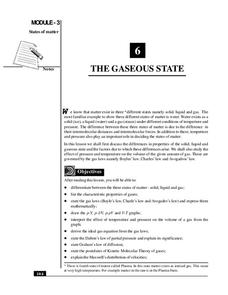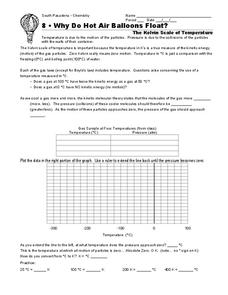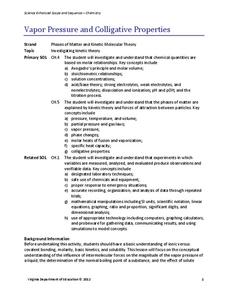Science Geek
Gas Laws
A physical science presentation begins with an explanation of ideal gases and their behavior. Then it introduces all of the gas laws with descriptions and formulas.
Science Geek
The Ideal Gas Law
When doing a gas lab, you might feel under pressure. A short presentation discusses the Ideal Gas Law. It begins with the units for each variable, then describes the behavior of real gases. The lesson concludes with a comparison of...
Curated OER
Gas Pressure, Volume, and Temperature
Physical science learners conduct a simple experiment using the heat of their hands to affect the fluid pressure. They place a balloon atop a freezing cold bottle and observe what occurs as it warms up. Both activities demonstrate how...
Curated OER
WS 5.2 Kinetic Theory-Temperature and Volume
In this kinetic theory instructional activity, students are given fifteen questions about gases and their kinetic energy, how temperature effects kinetic energy, and the results of changing conditions of gases on the kinetic energy. They...
Virginia Department of Education
Charles’ Law
Searching for a relatively interesting way to demonstrate Charles' Law? Here is a lesson in which pupils heat air inside a flask and then cool the flask to quickly cool the air. They make observations about what occurs during the...
Curated OER
Gases
In this gas worksheet, students convert within units of pressure and temperature, they solve problems using the various gas laws, they explain concepts as they related to the kinetic molecular theory and they discuss details of a...
Curated OER
States of Matter and Gas Laws
In this matter worksheet, students review the states of matter and the gas law formulas and equations. Students then complete 7 multiple choice questions and 6 problems.
Science Geek
Kinetic Molecular Theory
The fourth presentation in a series of five begins with information about the nature of gases and what to expect from them. Then it discusses kinetic molecular theory, diffusion, and Graham's Law, and concludes with the purification of...
Steinhardt Apps
Kinetic Molecular Theory
Building off young chemists' knowledge of the states of matter, kinetic molecular theory is the focus of the unit. Eight days of lessons including multiple demonstrations, one lab experiment, directed instruction, and worksheets,...
Virginia Department of Education
Molar Volume of a Gas
What is a chemist's favorite plant? Stoichiome Tree! Scholars produce hydrogen gas by reacting magnesium with hydrochloric acid. Then they calculate the molar volume of the gas produced before answering assessment questions.
Curated OER
Gases Worksheet
In this gases instructional activity, students solve twenty problems using the gas laws and their understanding of the relationship between energy and temperature and energy and velocity.
Curated OER
Practice Final
A full-fledged practice final prepares pupils for their general chemistry final exam. If they complete these 57 multiple-choice questions correctly, they will be well-prepared. Note: even though the questions are multiple-choice, there...
Curated OER
Behavior and Properties of Gases
Students convert Celsius to Kelvin temperature. Students conduct three lab experiments, gas law simulations using Internet applets, lectures and demonstrations. The Laws included are Boyle's, Charles, Combined Gas, Ideal Gas, and Gram's...
Curated OER
Gases
In this gases activity, students review the kinetic molecular theory and use the ideal gas law to solve 20 problems.
Curated OER
Understanding Behavior of Gases
If you want your young chemists to fully grasp the behavior of gases, here is an all-inclusive lesson plan. It provides handouts of detailed instructions for three laboratory activities, assessment reccomendations, and a list of...
National Institute of Open Schooling
The Gaseous State
Sixth in a series of 36, this lesson focuses on gases and their behavior in given situations. Learners review the states of matter and then focus on gases, specifically learning Boyle's, Charles's, Avogadro's Laws, Dalton's, and Graham's...
Virginia Department of Education
Partial Pressure
At some point, everyone has been under pressure—even Dalton! Explore Dalton's law of partial pressures with young chemists as they measure the volume of air extracted from a sample compared to its original volume. Class...
Curated OER
Why Do Hot Air Balloons Float?
In this gases instructional activity, students read about the Kelvin scale of temperature, they answer 3 fill in the blank questions about the relationship between temperature and pressure and they plot the temperature and pressure of...
Curated OER
IB Chemistry Practice Test
In this chemistry review worksheet, students practice using Avogadro's number, calculating number of moles, and using the gas laws. This worksheet has 39 multiple choice questions.
Rice University
College Physics for AP® Courses
Take a look at an organized physics course. The 34-section electronic textbook covers material in AP® Physics 1 and 2. Teachers use the text to supplement lectures and have the class work through the labs. Each section contains...
Curated OER
Alka Rockets! An Introduction to Kinetics
Students identify the factors that influence reaction rates. For this chemistry lesson, students design an experiment to test one factor they identified. They perform the experiment and share the results to the entire class.
Virginia Department of Education
Vapor Pressure and Colligative Properties
Hate to vacuum, but enjoy using a vacuum pump? Explore a lesson that starts with a demonstration of boiling water at various temperatures by using a vacuum pump. Then scholars design their own experiments to measure vapor pressure and...
Curated OER
Atoms, Kinetic Theory, Solids and Fluids
Students identify and describe the building blocks that make up an atom. They also compare the ages of atoms to the ages of the materials they compose,as well as, give examples that illustrate the small size of atoms.
Curated OER
Where My Peeps At?
Students conduct a series of activity that demonstrates Charles' and Boyle's Law. In this chemistry instructional activity, students determine the relationship among pressure, volume and temperature. They solve problems using...
